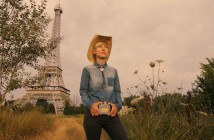Ida (2013)
Cast: Agata Kulesza, Agata Trzebuchowska, Dawid Ogrodnik
Director: Pawel Pawlikowski
Country: Poland | Denmark
Genre: Drama
Editor’s Notes: Ida opens in Toronto Friday, May 9th at the TIFF Bell Lightbox.
When Ida opens, its title character is an almost literal nonentity. She exists at the bottom corner of director Pawel Pawlikowski’s frames, hidden from the world, but also largely hidden from herself. Raised in an orphanage and known as Anna, this girl (Agata Trzebuchowska) seems to have gone from one place where she can remain nameless and self-less (not to mention selfless) to another, as she aims to become a nun in Poland in 1960. Before she can take her vows, however, she is told she must learn about her past by visiting her only living relative. Before five minutes of the film have passed, she has learned earth-shattering truths: Her real name is Ida, and she is really Jewish, orphaned during the Nazi occupation of Poland.
When Ida opens, its title character is an almost literal nonentity. She exists at the bottom corner of director Pawel Pawlikowski’s frames, hidden from the world, but also largely hidden from herself.
Pawlikowski shoots the film in an austere black-and-white that recalls the period in a sense, but that also serves as a constant reminder of how stark a world Anna has lived in to this point, and how colorless her life might remain. Pawlikowski’s intense focus on his actor’s faces, and the way he frames them, off center in shots as they move uncertain through their lives, some dangerously naïve, others punishingly cynical is reminiscent of Ingmar Bergman, as is the way the story gains a slowly devastating power. Anna quickly meets her Aunt Wanda (Agata Kulesza), a pessimistic communist who flatly tells Anna she didn’t claim her because they would not have made good company. Soon, the mismatched pair set off to find information about Anna’s parents and, eventually, to seek out the men who killed them.
Pawlikowski’s intense focus on his actor’s faces, and the way he frames them, off center in shots as they move uncertain through their lives…
As Anna weathers these existential crises, she finds another in a saxophonist (Dawid Ogrodnik) at a local dance hall. Ida sets itself up as the story of Anna reconciling herself with a world she has spent her life divorced from, experiencing temptation, but mostly just experiencing life after years of being sheltered. But it is also the story of Wanda, a bruised woman who has weathered hard times and has seen too much of the world she is revealing to her niece. Pawlikowski asks us to observe and embrace these women, but also to place them in a larger context within the history of his native Poland—at a place and a time where Poland was still recovering from the atrocities it had experienced at the hands of the Nazis, and the way it had in some sense perpetuated them. Though at first glance, Ida is a small scale, intensely focused drama of discovery, upon rumination it becomes clear the film has much more on its mind than just the fates of its two central women; it contemplates the fates of a nation, the sweep of history and the way it manages to catch people up in its swell, whether or not they have any desire to become involved. Anna learns much of herself as she glances back at her past, as she learns of the darkness from which she has come and tentatively tries to decide what it means for where she may be going. The world is out there, just beyond the edges of the frame, just beyond her perception. It’s begging to be found, and it’s stranger and more superb, more dangerous and more wondrous than Anna, or any of us, can possibly imagine.
Though at first glance, Ida is a small scale, intensely focused drama of discovery, upon rumination it becomes clear the film has much more on its mind than just the fates of its two central women; it contemplates the fates of a nation, the sweep of history and the way it manages to catch people up in its swell, whether or not they have any desire to become involved.




